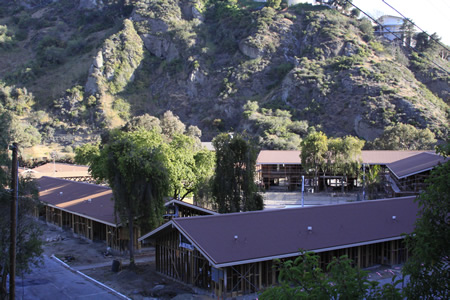By Jennifer Erickson | LB Indy

The California Coastal Commission effectively lodged a stick in the wheels of progress for the makeover of the 84-acre Ranch in Aliso Canyon last week.
A letter to co-owner Mark Christy informed him he risks enforcement action if ongoing work on the property doesn’t cease until the Coastal Commission issues a coastal development permit. That includes work the city had deemed exempt from requiring a CDP, as well as proposed renovations that the Laguna Beach Planning Commission issued development permits for on May 14. The Coastal Commission on July 9 found “substantial issue” with Laguna Beach resident Mark Fudge’s appeal of the Planning Commissions approval of those permits, effectively voiding them.
In her letter to Christy, coastal program analyst Liliana Roman requested voluminous additional information and documentation, noting that a de novo hearing of the project, and any hope for Christy to move forward, will not be scheduled until the requested materials are received and “determined to be adequate.”
“We are doing a long-overdue, minor restoration of the hotel rooms and an environmentally sensitive and caring project on the whole,” said Christy, who met several members of the Coastal Commission staff at the project site on Monday.
He said that he appreciated their taking the time to “see for themselves the reality of the scope of work.” After going over the items outlined in Roman’s letter, Christy took them on a tour of the property. “I cannot speak for the staff, but I think it was beneficial for them to tour the entire project first hand as we have nothing to hide,” he said, noting that he intends to await resolution of the appeal before commencing the specific work approved by the Planning Commission in May.
The litany of requests includes in part: documentation of overnight rates at the hotel for the past 20 years along with a description of proposed post-remodel rates; a site map of the historic tree grove and scout camp and description of any work in those areas; a title report to clarify any deed restrictions on use of the camp; documentation as to why the remodeled structures should be exempt from complying with flood proofing; surveys of past and current bird nesting; a biological survey of flora and fauna throughout the grounds; and drainage plans.
The city issued a building permit for the current work on the property in December. It covers an interior remodel of the existing 64-room hotel with no increase in rooms, exterior facade changes and removal of dilapidated carports. The work was deemed a “minor” remodel by the city and thus exempted from a coastal development permit.
Planned renovations requiring the coastal development permit approved by the Planning Commission, such as refiguring the hotel’s 64 rooms into 93, a restaurant makeover and a spa and fitness center addition, have not yet commenced. These are two separate projects, Gregory Pfost, the city’s director of community development, pointed out in July 8 letter to the Coastal Commission.
The coastal staff analyst disagreed. Roman said she viewed the remodel, deemed minor by city staff, as a “necessary” precursor to the proposed creation of 33 new rooms through subdivision, which constitutes an intensification of use that requires a coastal development permit. By that interpretation, the remodel is no longer minor and requires a coastal development permit as well.
The city staff continues to defend its decision. The remodeling of the interior and exterior facades does not create additional rooms and is not necessary to their creation, the city’s planning manager Ann Larson rebutted in a July 24 reply to Roman.
The work now in progress “is not an intensification in any way,” Christy said.
The Coastal Commission originally found “substantial issue” with Fudge’s appeal based on his assertions that the city’s permit approval process failed to adequately address the project’s impact on affordable public accommodations, parking, historical and biological resources, water quality and other issues.
Pfost argued that none of those assertions involves a substantial issue in a letter submitted to the commission the day before the July meeting. He contended that the city staff thoroughly investigated the issues before granting permits.
“I’m completely comfortable,” with the Planning Commission’s unanimous decision, said Robert Zur Schmiede, then chair of the panel and now a candidate for City Council. “It was a fair and impartial hearing,” that took into account all of the testimony given and included detailed discussions of the issues before them, he said.
Meanwhile, The Ranch at Laguna Beach web site has posted a plea to the public to sign a petition to dismiss the appeal. As of Wednesday, the petition had 1,300 signatures towards a goal of 5,000.





[…] “Coastal Commission Halts Ranch Remodel.” A few points come to mind of my recent tour of the Ranch property with Mark Christy. […]
[…] your documentation request of The Ranch owners, you neglected to ask for a map of animal scat on the property. Be sure to […]